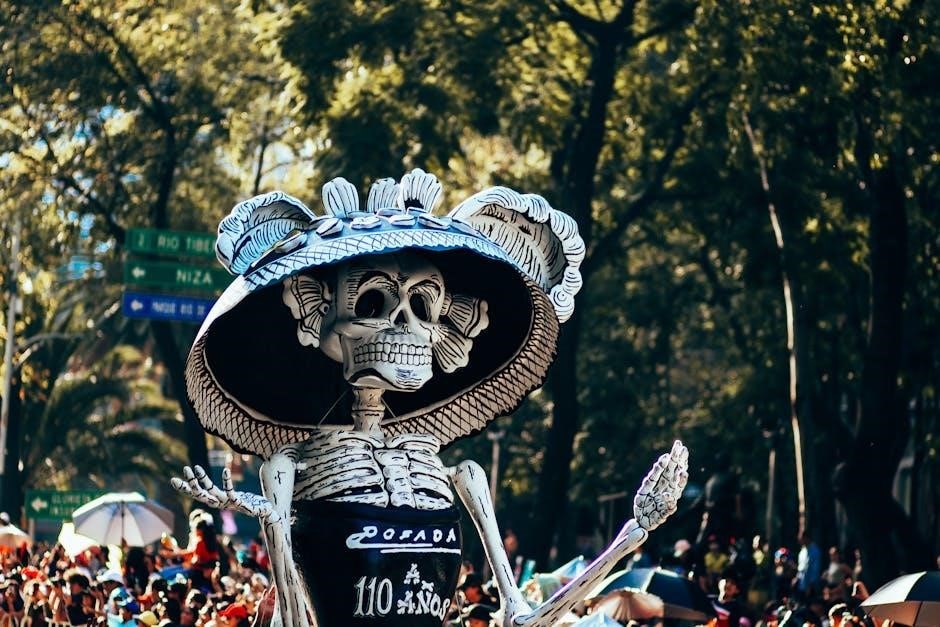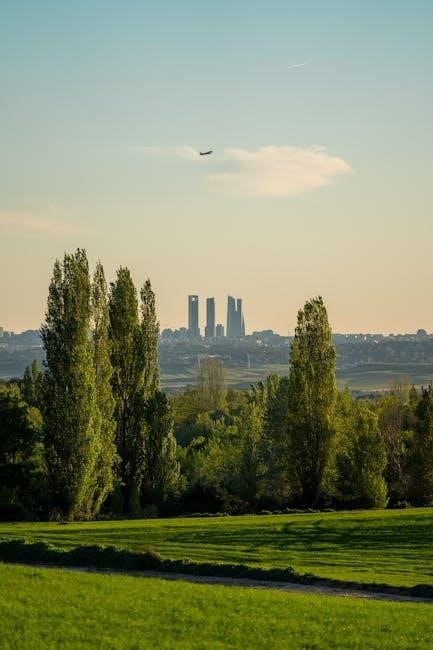This traditional Mexican song is a heartfelt plea for shelter‚ central to the Posadas celebrations‚ reflecting the journey of Mary and Joseph‚ with its lyrics and PDF versions widely available․
Overview of the Traditional Song
“En el Nombre del Cielo os Pido Posada” is a traditional Mexican song deeply rooted in the Posadas celebrations‚ a nine-day observance commemorating the journey of Mary and Joseph․ The song serves as a heartfelt plea for shelter‚ reflecting the biblical narrative of the Holy Family’s search for lodging in Bethlehem․ Its soulful melody and poignant lyrics have made it a cornerstone of Mexican cultural and religious traditions․ The song is typically sung during the reenactment of the Posadas‚ where participants request shelter (posada) at various homes‚ symbolizing the Holy Family’s journey․ The lyrics emphasize themes of humility‚ faith‚ and the kindness of strangers‚ resonating deeply with both religious and cultural sentiments․ The availability of PDF versions of the song’s lyrics and sheet music has made it accessible to a wider audience‚ preserving its legacy for future generations․
Cultural Significance in Mexican Posadas Celebrations
The song “En el Nombre del Cielo os Pido Posada” holds profound cultural and religious significance in Mexico‚ being a cornerstone of the Posadas festivities․ This traditional melody embodies the spirit of community and faith‚ as families and neighbors reenact the journey of Mary and Joseph․ The song’s lyrics‚ often shared in PDF formats‚ are memorized and sung collectively‚ fostering a sense of unity and shared heritage․ It bridges generations‚ with children learning the verses from their elders‚ ensuring the tradition’s continuity․ The song’s emotional appeal and historical roots make it a vital element of Mexican identity‚ reflecting the country’s deep-rooted Catholic traditions and the values of hospitality and compassion․ Its presence in every Posadas celebration underscores its enduring importance in Mexican culture․

Lyrics and Structure of the Song
This traditional song is a heartfelt request for shelter‚ featuring a call-and-response exchange between “afuera” and “adentro‚” with its simple structure and emotional depth․ Its lyrics‚ available in PDF‚ capture the essence of the Posadas tradition․
Complete Lyrics in Spanish
The song begins with the heartfelt request: “En el nombre del cielo os pido posada‚ pues no puede andar mi esposa amada․” This verse captures the essence of the Posadas tradition‚ reflecting the journey of Mary and Joseph seeking shelter․ The lyrics continue with a dialogue between those outside (“afuera”) and those inside (“adentro”)‚ exchanging pleas and responses․ The full verses highlight the emotional and spiritual significance of the song‚ which is deeply rooted in Mexican culture․ The complete lyrics in Spanish are widely available in PDF format‚ allowing for easy access and participation in this cherished tradition․ The song’s simplicity and sincerity make it a cornerstone of holiday celebrations․
English Translation of the Song
In the name of heaven‚ I ask you for shelter‚ for my beloved wife cannot walk․ This heartfelt opening verse sets the tone for the song‚ which reflects the journey of Mary and Joseph seeking refuge․ The dialogue continues with those outside (“afuera”) pleading: “Do not be inhuman‚ have mercy on us‚ for the God of the heavens will reward you․” The response from inside (“adentro”) firmly yet compassionately denies entry: “This is not an inn‚ keep moving․ I cannot open the door․” The translation captures the emotional depth and spiritual essence of the original Spanish lyrics‚ maintaining their cultural and religious significance․ The PDF version of the song is widely accessible for those wishing to explore it further․
Verse-by-Verse Analysis
The song begins with a poignant request: “In the name of heaven‚ I ask you for shelter‚ for my beloved wife cannot walk․” This verse reflects the weary journey of Mary and Joseph‚ seeking refuge․ The next line‚ “Do not be inhuman‚ have mercy on us‚ for the God of the heavens will reward you‚” emphasizes the plea for compassion and divine reciprocity․ The response from inside‚ “This is not an inn‚ keep moving․ I cannot open the door‚” symbolizes rejection‚ mirroring the biblical narrative․ The dialogue between “afuera” (outside) and “adentro” (inside) creates a dramatic exchange‚ highlighting themes of perseverance and faith․ Each verse builds emotional depth‚ connecting the song’s lyrics to the spiritual essence of the Posadas tradition․

Historical Context of the Song
En el Nombre del Cielo os Pido Posada originates from Mexico’s Posadas tradition‚ dating back to the 16th century․ It reflects the biblical story of Mary and Joseph seeking shelter‚ blending Catholic devotion with indigenous customs․ The song has evolved over centuries‚ becoming a cornerstone of Navidad celebrations‚ symbolizing faith‚ hospitality‚ and community․ Its enduring relevance underscores its cultural and spiritual significance in Mexico and beyond․
Origins of the Posadas Tradition
The Posadas tradition‚ central to Mexican culture‚ dates back to the 16th century․ It begins on December 16th and lasts nine days‚ symbolizing the journey of Mary and Joseph․ This period‚ known as Las Novenas‚ reflects their search for shelter in Bethlehem․ The tradition was introduced by Spanish missionaries to evangelize indigenous communities‚ blending Catholic rituals with native customs․ The song En el Nombre del Cielo os Pido Posada is a cornerstone of this celebration‚ used to request shelter and symbolize the fusion of faith and hospitality․ Over time‚ it has evolved into a vibrant cultural practice‚ enriching Mexico’s spiritual and festive heritage․ Its origins highlight the enduring blend of religion and tradition in Mexican identity․
Religious and Cultural Roots of the Song
En el Nombre del Cielo os Pido Posada is deeply rooted in both religious devotion and cultural identity․ Its lyrics echo the biblical narrative of Mary and Joseph’s journey to Bethlehem‚ seeking refuge․ This song is integral to Mexico’s Posadas celebrations‚ which blend Catholic traditions with indigenous customs․ The song’s melody and structure reflect traditional Mexican music‚ while its words convey a spiritual plea for hospitality․ It serves as a bridge between faith and culture‚ uniting communities in a shared experience of prayer and celebration․ The song’s enduring popularity highlights its significance as a cultural and religious anthem‚ passed down through generations and cherished during the festive season․

Availability of the PDF Version
The PDF of En el Nombre del Cielo os Pido Posada is widely available online‚ offering free downloads for personal or communal use during Posadas celebrations and beyond․
Where to Download the PDF
The PDF version of En el Nombre del Cielo os Pido Posada can be easily downloaded from various online platforms․ Popular song repositories and cultural websites offer free access to this traditional hymn․ Additionally‚ religious and educational sites provide downloadable versions for personal or communal use during Posadas celebrations․ Some platforms also include sheet music and lyrics in both Spanish and English for convenience․ Users can search for “En el Nombre del Cielo os Pido Posada PDF” on trusted sites like music libraries or cultural archives to find and print the document instantly․ This ensures accessibility for everyone celebrating this meaningful tradition․
Free Sheet Music for “En el Nombre del Cielo os Pido Posada”
The free sheet music for En el Nombre del Cielo os Pido Posada is widely available online‚ ensuring accessibility for all who wish to perform or study this traditional piece․ Websites specializing in PDF downloads offer high-quality versions of the song‚ including both lyrics and musical notation․ Many platforms provide the sheet music in MIDI format as well‚ catering to musicians who prefer digital tools․ Additionally‚ some cultural and educational sites offer free downloads‚ making it easy for individuals and groups to use this hymn during Posadas celebrations․ The sheet music often includes chords and melodies for instruments like the guitar or piano‚ enhancing its versatility for performers․

Musical Composition and Harmony
The song features simple yet emotive melodies‚ traditionally accompanied by guitar chords like D7‚ G‚ and A7‚ creating a harmonious backdrop that enhances its cultural and religious essence․
Chords and Melody for Guitar or Piano
The melody of “En el Nombre del Cielo os Pido Posada” is simple yet emotive‚ typically played in a minor key to reflect its solemn tone․ The song is often accompanied by guitar chords such as D7‚ G‚ D‚ and A7‚ which create a harmonious and traditional sound․ For piano‚ the same chords can be adapted into arpeggios or gentle melodies to maintain the song’s essence․ The verse structure follows a repeating pattern‚ making it easy to learn and play․ Musicians can emphasize the refrain with chord progressions like D ⏤ A7 ― D‚ adding depth to the performance․ This adaptability allows the song to be enjoyed by both skilled players and beginners alike․
Sheet Music in MIDI Format
Sheet music for “En el Nombre del Cielo os Pido Posada” is widely available in MIDI format‚ offering a digital rendition of the song’s melody and harmony․ MIDI files provide a versatile way to play and edit the music using software or electronic instruments․ Websites like music repositories and cultural platforms offer free downloads of this traditional song in MIDI‚ allowing musicians to adapt it to various instruments or arrangements․ The MIDI format preserves the song’s traditional essence while enabling modern interpretations․ It’s a popular choice for both personal enjoyment and community performances during Posadas celebrations‚ ensuring the song’s timeless appeal endures through digital means․

Modern Interpretations and Performances
The traditional song is now performed in contemporary styles‚ blending modern instruments with its timeless melody‚ keeping its cultural essence alive in today’s celebrations․
Contemporary Versions of the Song
Contemporary artists have reimagined “En el Nombre del Cielo os Pido Posada” with modern twists‚ blending traditional melodies with genres like mariachi‚ pop‚ and even electronic music․ These versions often feature collaborations between renowned musicians and emerging talents‚ creating a fresh yet respectful interpretation of the classic․ The song’s timeless message is preserved while appealing to younger generations․ Many modern adaptations incorporate instruments like electric guitars and synthesizers‚ giving the track a vibrant‚ dynamic feel․ Despite these changes‚ the core essence of the song remains intact‚ ensuring its cultural and religious significance endures in today’s diverse musical landscape․
Cultural Significance in Modern Celebrations
The song remains a cornerstone of Mexican cultural identity‚ preserving the essence of the Posadas tradition․ In modern celebrations‚ it fosters community bonds and spiritual reflection‚ transcending generations․ Its lyrics‚ available in PDF formats‚ are widely shared‚ ensuring its legacy endures․ The song’s themes of faith and hospitality resonate deeply‚ especially during the festive season․ Schools and churches often incorporate it into performances‚ teaching younger generations about their heritage․ Even in urban settings‚ the song’s presence in parades and events highlights its adaptability and enduring relevance․ Its cultural significance is a testament to the vibrant traditions that shape modern Mexican identity and celebrations worldwide․
The song “En el Nombre del Cielo os Pido Posada” is a cherished tradition‚ deeply rooted in Mexican culture and faith‚ continuing to inspire and unite communities during Posadas․
Final Thoughts on the Song’s Importance
The song “En el Nombre del Cielo os Pido Posada” holds profound cultural and religious significance‚ embodying the spirit of Mexico’s Posadas celebrations․ Its lyrics‚ available in PDF format‚ reflect the journey of Mary and Joseph‚ resonating deeply with communities․ The traditional melody and harmonious structure‚ often accompanied by guitar or piano‚ evoke a sense of unity and faith․ As a symbol of hospitality and devotion‚ this song continues to inspire modern interpretations while preserving its historical roots․ Its availability in MIDI and sheet music formats ensures its legacy endures‚ connecting generations in celebration and reflection․

Leave a Reply
You must be logged in to post a comment.